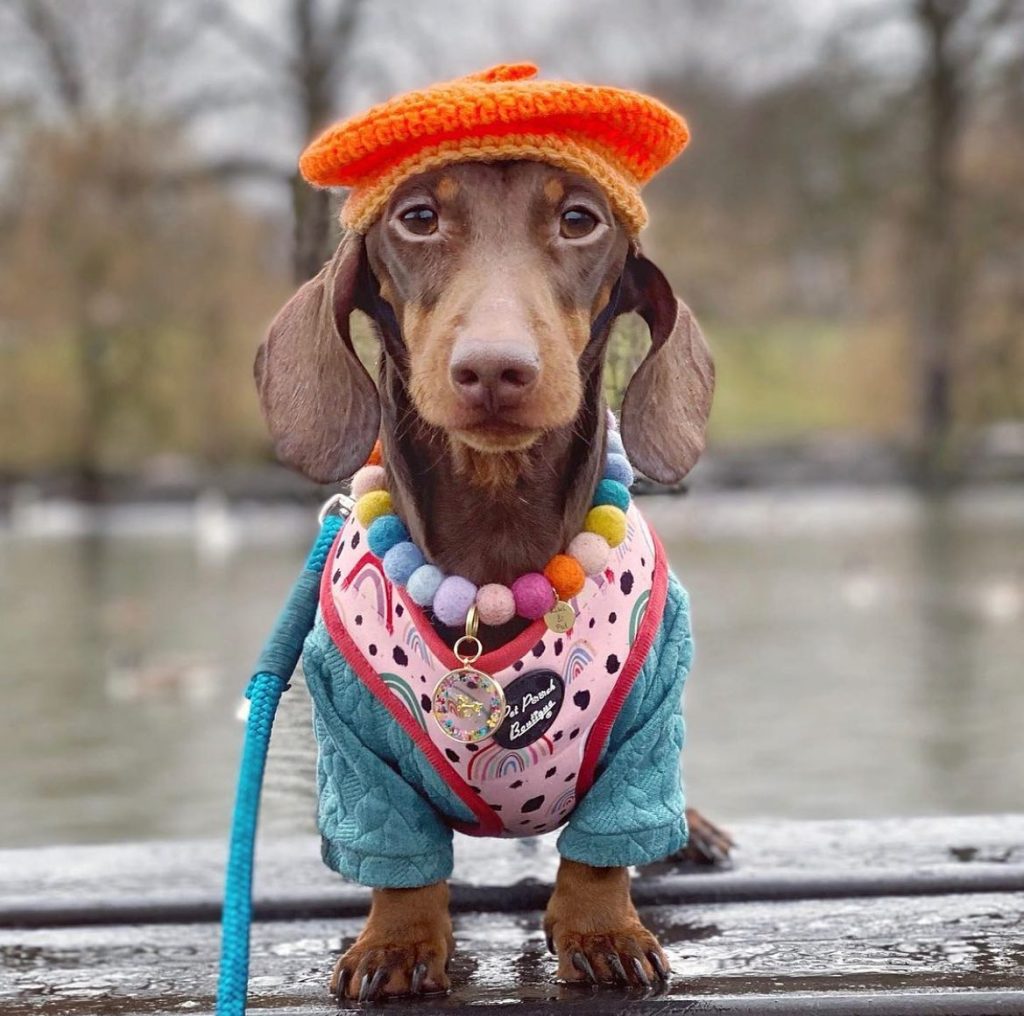Dachshunds, often affectionately known as “wiener dogs” due to their long bodies and short legs, are one of the most recognizable and beloved dog breeds in the world. Originating from Germany, the name “Dachshund” literally translates to “badger dog,” which is a nod to their original breeding purpose—hunting badgers. Over the years, Dachshunds have transitioned from fierce hunters to charming and spirited companions in homes around the globe.

The Origin and History of Dachshunds Breed
The history of Dachshunds is as fascinating as the breed itself, dating back to at least the 15th century in Germany. However, their popularity surged in the 17th and 18th centuries when their breeding was more systematically organized. Initially bred to hunt small animals like badgers, their elongated bodies allowed them to delve into narrow burrows, and their tenacious spirit made them formidable hunters.
The breed’s characteristics have been refined over centuries, but their courageous and curious nature remains intact. In modern times, while the hunting instincts of Dachshunds are not as necessary, these traits contribute to their unique personality and behavior. The transition from a hunter to a household pet has been smooth for the Dachshund, showcasing their adaptability and enduring appeal.
Understanding Dachshunds Temperament
Dachshunds are more than just their distinctive shape; their character and personality are just as unique. Understanding these aspects is essential for anyone considering bringing a Dachshund into their home.
The Distinctive Appearance of Dachshunds
Dachshunds are instantly recognizable by their elongated bodies and short, stout legs—a design perfected for digging into burrows. Their long snouts enhance their ability to scent, making them exceptional hunters. Dachshunds come in three sizes: standard, miniature, and kaninchen (German for “rabbit”), although the latter is not officially recognized in all countries. Their coats can be smooth, long, or wire-haired, each requiring different grooming routines.
Personality and Character Traits of Dachshunds
Dachshunds possess a brave and adventurous spirit, often surprising their owners with their boldness. Despite their small size, they can be quite protective and alert, making excellent watchdogs. Their loyalty to family is unparalleled, though they can be wary of strangers. It’s important to consider dachshund training tips and dachshund training guides early on, as their strong will and independence can make training a challenge. The miniature dachshund temperament is particularly spunky and spirited, which, while endearing, can require extra patience during training.
The Dachshund’s Breed Standard: Colors and Markings
Dachshunds boast a wide variety of colors and markings, from solid hues like red and cream to dappled (merle) and brindle patterns. The American Kennel Club recognizes many colors and patterns, but some, like double dapple, are associated with health risks and are ethically controversial in breeding practices.
These traits combine to make the Dachshund a unique and lovable breed, requiring owners who appreciate their quirks and are willing to invest in their care and training.
Caring for Your Dachshund Puppy
Proper care is crucial for any pet, and Dachshunds, with their unique physique and spirited nature, require specific attention to their health, grooming, nutrition, and exercise needs.
Health Considerations in Dachshunds
Dachshunds are generally hearty dogs, but their distinctive body shape predisposes them to certain dachshund health problems. Being aware of these issues and knowing how to prevent or manage them can greatly improve the quality of life for these little dogs.
Common Health Issues and Preventative Care
- Intervertebral Disc Disease (IVDD): Due to their long spines, Dachshunds are prone to back issues, particularly IVDD, which can lead to pain, nerve damage, and even paralysis. Preventative measures include maintaining a healthy weight, avoiding activities that put stress on the spine, and using harnesses instead of neck collars.
- Obesity: Their small size and propensity for weight gain make obesity a significant concern, which can exacerbate back problems and lead to other health issues.
- Dental Problems: Dachshunds are also prone to dental issues, so regular dental check-ups and cleanings are essential.
- Patellar Luxation: This condition, where the kneecap dislocates, is common in many small breeds, including Dachshunds.
Engaging in regular vet check-ups and being proactive about health can mitigate many of these risks.
Grooming Your Dachshund
Grooming needs vary among the three coat types (smooth, long-haired, and wire-haired) but all Dachshunds benefit from regular brushing to reduce shedding and prevent matting. Nails should be trimmed regularly to prevent discomfort and mobility issues, and ear care is essential, especially for long-haired varieties, to avoid infections.

Nutritional Needs of Dachshunds
Dachshunds’ nutritional needs must be carefully managed to avoid obesity while supporting their energetic lifestyle. Here are some key considerations:
- High-Quality Protein: A diet rich in high-quality protein supports muscle health and energy levels.
- Controlled Fat Content: While fats are essential, their caloric density means they should be carefully balanced to prevent weight gain.
- Fiber: Adequate fiber helps maintain digestive health.
- Joint Support Supplements: Ingredients like glucosamine can support joint health, particularly important for Dachshunds due to their spine and joint vulnerability.
Always ensure fresh water is available, and discuss your Dachshund’s diet with your vet to tailor it to their specific needs.
Exercise and Training Essentials for Dachshunds
Despite their small size, Dachshunds have high energy levels and require regular exercise to maintain their health and prevent boredom. Daily walks, play sessions, and mentally stimulating activities like puzzle toys can keep them engaged and out of trouble.
When it comes to training, it’s important to start early. Dachshunds can be stubborn, so patience and consistency are key. Utilize positive reinforcement techniques and consider enrolling in obedience classes for support. While are dachshunds aggressive is a common question, proper socialization from a young age can help prevent any aggression and make them well-adjusted pets.
Many owners attest to why Dachshunds are the best breed, citing their loyalty, courage, and affectionate nature. However, they do best with owners who understand their specific needs and are committed to meeting them.
Caring for a Dachshund requires a dedicated approach to their health, grooming, nutrition, and exercise needs, but the reward is a happy, healthy companion who brings joy and amusement to your life.
Living with a Dachshund Pet

Adopting a Dachshund means welcoming a bundle of energy, intelligence, and character into your home. Understanding how they fit into family life, their inherent traits, and their historical background can enhance your cohabitation experience.
Dachshunds as Family Pets: Compatibility with Kids
Dachshunds can make wonderful family pets when properly socialized and trained. Their playful and loyal nature makes them great companions for children. However, due to their small size and long backs, it’s important to teach children how to handle them gently to avoid injuries. Supervision during interactions is essential to ensure the safety of both the dog and the children. With the right guidance, Dachshunds and kids can form strong, loving bonds.
Breed-Specific Traits and Activities
Dachshunds possess several breed-specific traits that can be both endearing and challenging. Engaging them in activities that cater to these traits can lead to a fulfilling life for both the dog and its owners.
- Burrowing: Their natural instinct to dig and burrow can be channeled into fun activities like hide-and-seek with toys or creating a designated digging area in the yard.
- Chasing: Their hunting heritage means they love to chase. Engaging in controlled chase games can be a great way to exercise.
- Scent Work: Dachshunds have an excellent sense of smell. Scent work games or sports can provide mental stimulation and satisfy their tracking instincts.
- Agility Training: Despite their size, Dachshunds can excel in agility training adapted to their capabilities, which can help with obedience and energy management.
Understanding the Dachshund’s Hunting Heritage
The Dachshund’s design is no accident; bred for hunting, their long bodies and keen senses made them ideal for tracking and flushing out tunneling animals. This heritage influences many of their behaviors today, from their love of digging to their strong prey drive. Understanding this background helps explain their tenacity, independence, and why they might engage in certain behaviors, like barking or digging. Respecting and accommodating these natural instincts, while setting boundaries, can lead to a harmonious living arrangement.

Living with a Dachshund is a unique adventure filled with fun, challenges, and the unparalleled companionship of a spirited, affectionate pet. Their size, combined with their lively personality, makes them adaptable to various living situations, from apartments to homes with yards, as long as their physical and mental needs are met.
Frequently Asked Questions About Dachshunds
Do Dachshunds Shed?
Yes, Dachshunds do shed, but the amount varies by coat type. Smooth-haired Dachshunds shed moderately throughout the year, while long-haired and wire-haired varieties might shed less but require more grooming to manage dead hair and prevent matting.
Are Dachshunds Hypoallergenic?
No, Dachshunds are not considered hypoallergenic. Like all dog breeds, they produce dander (skin flakes) and saliva, which are common allergens. Regular grooming and cleaning can help minimize allergens in the home.
Can Dachshunds Swim?
Dachshunds can swim, but their long bodies and short legs don’t make them natural swimmers. Always supervise them around water, and consider a doggy life vest for safety. Some may enjoy water more than others, so it’s important to introduce them to swimming gently and see how they respond.
Dealing with Potential Aggressiveness
Dachshunds can exhibit aggressive behavior if not properly trained and socialized. This can stem from fear, territorial instincts, or hunting drive. Consistent, positive reinforcement training from a young age, along with proper socialization, can help manage and reduce aggressive tendencies.
The Truth About Dachshunds and Their Ability to Coexist with Kids
Dachshunds can coexist happily with kids when proper boundaries are set. Educating children on how to interact safely and respectfully with the dog is crucial. Supervised interactions ensure that both the dog and children learn how to behave around each other, fostering a safe and loving environment.

Final Thoughts on Owning a Dachshund
Owning a Dachshund can be a joyful and rewarding experience. These charming dogs bring a lot of personality, loyalty, and affection into a home. Their size makes them adaptable to various living situations, but potential owners should be mindful of their specific care needs, including health considerations, exercise, and training. Understanding and embracing their unique traits can lead to a harmonious and fulfilling relationship.
Is a Dachshund the Right Dog for You?
Choosing a Dachshund as a pet should be a decision grounded in an understanding of their characteristics and needs. If you’re looking for a spirited companion with a big personality, are willing to invest time in training and exercise, and don’t mind the grooming requirements, a Dachshund could be a great fit. Assess your lifestyle, living environment, and ability to meet their needs to ensure a happy life together.
